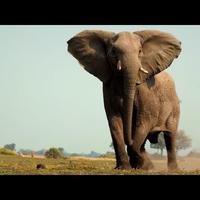Helping to Protect the Okavango Basin | National Geographic
This is a perfect wilderness.
It's vast.
Unending.
When this wetland floods, it grows to around 22 thousand square kilometers,
becoming visible from space.
Surrounded by the Kalahari Desert—
one of the driest places on earth—
the Okavango Delta is a water wonderland.
It is the jewel of the Kalahari.
It attracts biodiversity unrivalled in the region,
is home to the largest remaining elephant population on the planet
and creates a conservation-based tourism economy in Botswana
that supports many thousands of jobs.
The Delta itself is protected,
but the highlands and the rivers that supply it are not.
The story of this water begins thousands of kilometres north,
deep in the Angolan highlands—
in an area larger than 21 thousand soccer fields.
Every year the mighty Cuito and Cubango river systems
carry around nine and a half trillion liters of this water
down through Namibia
to spill out into the Okavango Delta in Botswana.
One, two, three!
As part of an ongoing conservation effort,
the National Geographic Okavango Wilderness Project
has surveyed these river systems.
They found the aftermath of a nearly three-decade civil war
has led to an increase in deforestation
and unchecked commercial agriculture,
putting the future of this wetland wilderness at risk.
But they have also discovered more than a hundred species believed to be new to science.
Today, the project is also focused on working with local communities
to secure the permanent, sustainable protection
that the greater Okavango Basin needs to survive.
Now, National Geographic has been joined by De Beers,
which has spent over 50 years discovering diamonds in partnership with the people of Botswana
while also supporting education,
healthcare,
livelihoods,
and wildlife conservation efforts.
De Beers' Building Forever commitment
strives to ensure that every diamond discovered
has a positive impact on people and the planet.
Through this new partnership,
De Beers and National Geographic will work together
to help conserve this entire water system.
Protecting wildlife corridors,
so that animals can roam freely.
Working with people from the region
to help create sustainable livelihoods.
And sharing the remarkable story of the Okavango with the world.
All to preserve one of the planet's greatest natural wonders.

